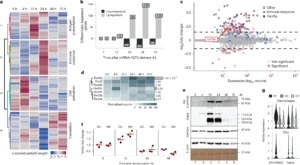
mRNA vaccines have been administered billions of times worldwide and their importance was underscored by the 2023 Nobel Prize in Physiology or Medicine, awarded to Katalin Karikó and Drew Weissman “for their discoveries concerning nucleoside base modifications that enabled the development of effective mRNA vaccines against COVID-19”. Nonetheless, mRNA vaccines have been the subject of controversy, some of it rooted in misinformation. For example, false claims and conspiracy theories about mRNA vaccines altering DNA gained traction, spreading fear of long-term consequences. Far from it, mRNA does not enter the nucleus and, even if it did, would not be able to interact with or change DNA. In fact, mRNA is highly unstable, making the effectiveness of mRNA vaccines rather surprising. A recent paper in Nature helps explain how the vaccine mRNAs manage to stick around long enough to produce the protein needed for an immune response. The authors found that an enzyme called TENT5A extends the mRNA poly(A) tails, which are crucial for mRNA stability and translation. The findings will aid the design of future mRNA therapeutics, which are under investigation for treating a range of diseases, from flu to cancer. The authors are particularly proud that the paper is exclusively a product of Polish institutions; yet the path to publication wasn’t easy – it took more than two years and multiple rounds of revision before their manuscript was accepted.
Re-adenylation by TENT5A enhances efficacy of SARS-CoV-2 mRNA vaccines
In Nature, 16 April 2025
From the groups of Andrzej Dziembowski and Seweryn Mroczek, International Institute of Molecular and Cell Biology and University of Warsaw
Snippet by Katrina Woolcock
Image credit: Figure 3 from Krawczyk et al. linked above (CC-BY)